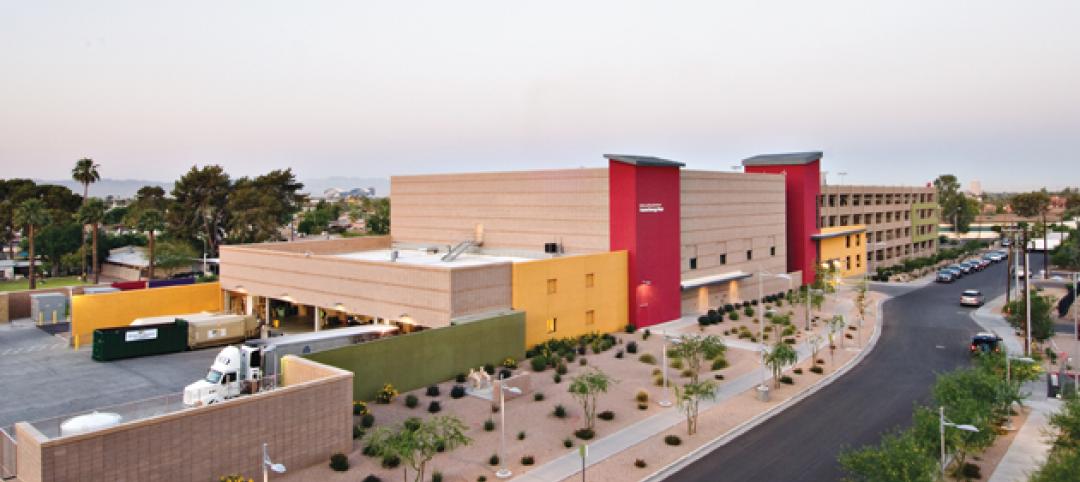Last spring, the U.S. Navy Facilities Engineering Command (NAVFAC) awarded a five-year, $50 million architect-engineering services contract to a joint venture between WSP USA and HKS for the Command’s medical facilities projects around the world.
This so-called indefinite delivery/indefinite quantity (IDIQ) contract covers hospitals, dental clinics, medical clinics, veterinary clinics, laboratories, sustainment/restoration/modernization projects, military construction projects, and medical studies.
The contract is not exclusive to the two firms, but it lets NAVFAC assign certain projects to them. NAVFAC selected seven projects under this contract for 2018, including a 477,000-sf, $298 million health, education, and research facility for the Uniformed Services University at Walter Reed National Military Medical Center in Bethesda, Md.; and a 44,000-sf medical and dental clinic in Jacksonville, N.C. There’s also a renovation component, plus four research studies that will help define future projects.
See Also: N.Y. builder pushes to get military trauma centers up and running quicker
WSP, which has been active in the healthcare sector for a quarter century, decided to compete for this contract after noticing that the AE presence in the government sector was “not as strong” as in other sectors, says Nolan Rome, PE, U.S. Healthcare Director for WSP’s Dallas office.
Rome says that he had seen IDIQ-type contracts in the past and thought that a combination with an architecture firm might work for both companies and the client. Over the previous seven years, WSP and HKS had collaborated on 42 healthcare projects for the military and private sector.
“We promised a one-stop shop for whatever the government would need, and they perceived us as something new and different,” says Jim Whitaker, AIA, DBIA, Principal and SVP with HKS. “Now, we’re the Navy’s go-to task-order vendor.”
NAVFAC follows a Uniform Facilities Criteria that touches on everything from design to scheduling. It also leans toward design-bid-build delivery, whereas the U.S. Army Corps of Engineers and the Veterans Health Administration prefer design-build. (Rome says WSP will self-perform 98% of the work under the NAVFAC contract.)
Each agency imposes spending limits, notably a 6% cap on total cost design services. “We’ve responded to those parameters with an integrated design approach,” says Alan Davis, Vice President for WSP’s Built Ecology, a national practice based on integration between architect and engineer.
Whitaker says that having a predetermined cost structure and pre-existing relationship can “make procurement easier.”
HKS and WSP have been talking with other government agencies about setting up similar contractual arrangements.
Related Stories
| Feb 14, 2013
Peter Bardwell named 2013 president of the American College of Healthcare Architects
The Board of Regents of the American College of Healthcare Architects (ACHA) has named Peter L. Bardwell, FAIA, FACHA of Columbus, Ohio as 2013 national President.
| Feb 6, 2013
George W. Bush Presidential Center among award-winning roofing projects honored by Sika Sarnafil
Winners of the 2012 Contractor Project of the Year Competition were announced this week by Sika Sarnafil. The annual competition highlights excellence in roofing installation. Roofing contractors are judged based on project complexity, design uniqueness, craftsmanship, and creative problem solving.
| Feb 6, 2013
RSMeans cost comparisons: office buildings and medical offices
RSMeans' February 2013 Cost Comparison Report breaks down the average construction costs per square foot for four types of office buildings across 25 metro markets.
| Dec 9, 2012
AEC professionals cautiously optimistic about commercial construction in ’13
Most economists say the U.S. is slowly emerging from the Great Recession, a view that was confirmed to some extent by an exclusive survey of 498 BD+C subscribers whose views we sought on the commercial construction industry’s outlook on business prospects for 2013.
| Nov 11, 2012
Greenbuild 2012 Report: Healthcare
Green medical facilities extend beyond hospital walls
| Oct 24, 2012
Loma Linda University Medical Center lets light in with metal wall systems
Designers for the building aimed to create a positive environment for patients and visitors, and wanted to let in as much natural daylight as possible.
| Oct 11, 2012
Hank Adams Named to Lead HDR’s Healthcare Program
With more than 25 years of experience, HDR vice president is tapped to lead firm's healthcare projects.
| Oct 10, 2012
Skanska to Construct Children’s Hospital of Richmond at Virginia Commonwealth University Pavilion
Skanska USA announced that it has been awarded an $80 million contract to construct a new Children’s Pavilion at Children’s Hospital of Richmond at VCU.
| Oct 2, 2012
Bernards working on project at L.A. White Memorial Medical Center
The new facility is a $15-million, 41,000-sf concrete structure which includes three stories of medical office space atop a three-level parking garage.

















